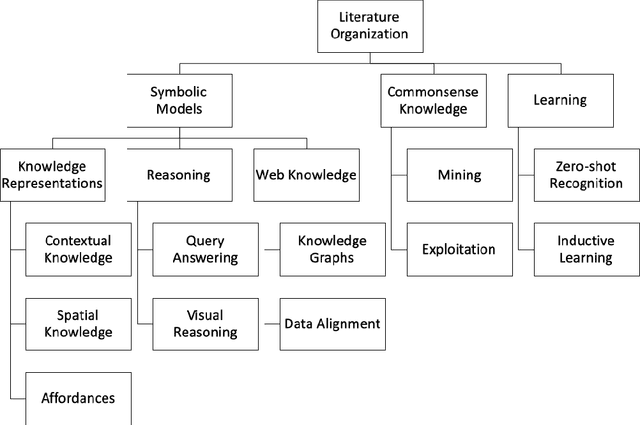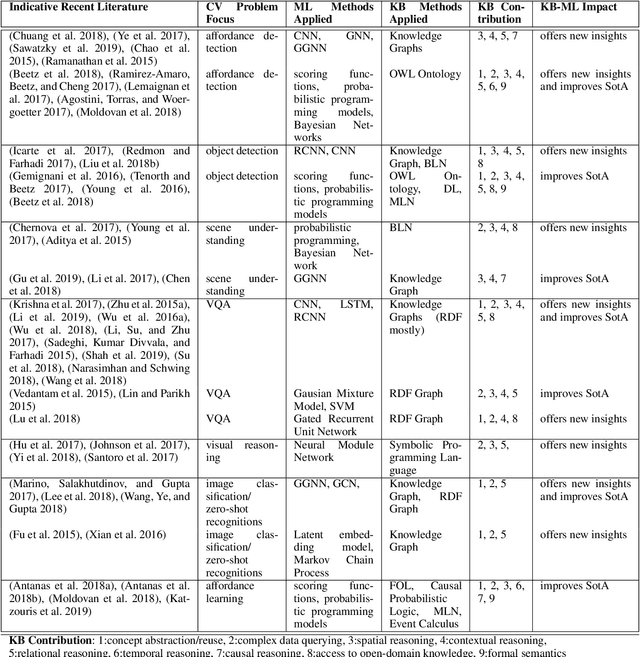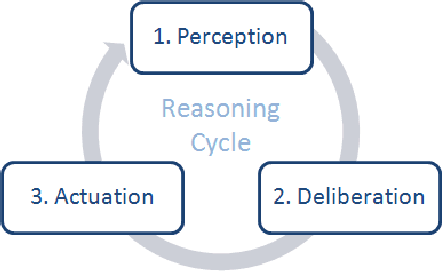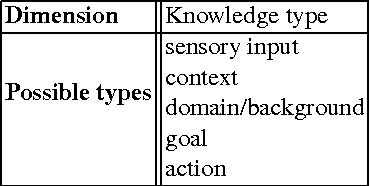Theodore Patkos
Leveraging Knowledge Graphs for Zero-Shot Object-agnostic State Classification
Jul 22, 2023



Abstract:We investigate the problem of Object State Classification (OSC) as a zero-shot learning problem. Specifically, we propose the first Object-agnostic State Classification (OaSC) method that infers the state of a certain object without relying on the knowledge or the estimation of the object class. In that direction, we capitalize on Knowledge Graphs (KGs) for structuring and organizing knowledge, which, in combination with visual information, enable the inference of the states of objects in object/state pairs that have not been encountered in the method's training set. A series of experiments investigate the performance of the proposed method in various settings, against several hypotheses and in comparison with state of the art approaches for object attribute classification. The experimental results demonstrate that the knowledge of an object class is not decisive for the prediction of its state. Moreover, the proposed OaSC method outperforms existing methods in all datasets and benchmarks by a great margin.
Deception detection in text and its relation to the cultural dimension of individualism/collectivism
May 26, 2021



Abstract:Deception detection is a task with many applications both in direct physical and in computer-mediated communication. Our focus is on automatic deception detection in text across cultures. We view culture through the prism of the individualism/collectivism dimension and we approximate culture by using country as a proxy. Having as a starting point recent conclusions drawn from the social psychology discipline, we explore if differences in the usage of specific linguistic features of deception across cultures can be confirmed and attributed to norms in respect to the individualism/collectivism divide. We also investigate if a universal feature set for cross-cultural text deception detection tasks exists. We evaluate the predictive power of different feature sets and approaches. We create culture/language-aware classifiers by experimenting with a wide range of n-gram features based on phonology, morphology and syntax, other linguistic cues like word and phoneme counts, pronouns use, etc., and token embeddings. We conducted our experiments over 11 datasets from 5 languages i.e., English, Dutch, Russian, Spanish and Romanian, from six countries (US, Belgium, India, Russia, Mexico and Romania), and we applied two classification methods i.e, logistic regression and fine-tuned BERT models. The results showed that our task is fairly complex and demanding. There are indications that some linguistic cues of deception have cultural origins, and are consistent in the context of diverse domains and dataset settings for the same language. This is more evident for the usage of pronouns and the expression of sentiment in deceptive language. The results of this work show that the automatic deception detection across cultures and languages cannot be handled in a unified manner, and that such approaches should be augmented with knowledge about cultural differences and the domains of interest.
A Review on Intelligent Object Perception Methods Combining Knowledge-based Reasoning and Machine Learning
Dec 26, 2019

Abstract:Object perception is a fundamental sub-field of Computer Vision, covering a multitude of individual areas and having contributed high-impact results. While Machine Learning has been traditionally applied to address related problems, recent works also seek ways to integrate knowledge engineering in order to expand the level of intelligence of the visual interpretation of objects, their properties and their relations with their environment. In this paper, we attempt a systematic investigation of how knowledge-based methods contribute to diverse object perception tasks. We review the latest achievements and identify prominent research directions.
An Event Calculus Production Rule System for Reasoning in Dynamic and Uncertain Domains
Dec 16, 2015



Abstract:Action languages have emerged as an important field of Knowledge Representation for reasoning about change and causality in dynamic domains. This article presents Cerbere, a production system designed to perform online causal, temporal and epistemic reasoning based on the Event Calculus. The framework implements the declarative semantics of the underlying logic theories in a forward-chaining rule-based reasoning system, coupling the high expressiveness of its formalisms with the efficiency of rule-based systems. To illustrate its applicability, we present both the modeling of benchmark problems in the field, as well as its utilization in the challenging domain of smart spaces. A hybrid framework that combines logic-based with probabilistic reasoning has been developed, that aims to accommodate activity recognition and monitoring tasks in smart spaces. Under consideration in Theory and Practice of Logic Programming (TPLP)
* Under consideration in Theory and Practice of Logic Programming (TPLP)
Different Types of Conflicting Knowledge in AmI Environments
Dec 26, 2014


Abstract:We characterize different types of conflicts that may occur in complex distributed multi-agent scenarios, such as in Ambient Intelligence (AmI) environments, and we argue that these conflicts should be resolved in a suitable order and with the appropriate strategies for each individual conflict type. We call for further research with the goal of turning conflict resolution in AmI environments and similar multi-agent domains into a more coordinated and agreed upon process.
 Add to Chrome
Add to Chrome Add to Firefox
Add to Firefox Add to Edge
Add to Edge